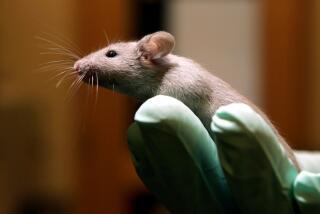Spermless mosquitoes could help reduce malaria’s spread
- Share via
Forget mosquito netting and bug spray. Researchers are focusing on another way to reduce the numbers of the malaria-spreading blood-suckers: introduce spermless males into the population.
In a study released Monday, researchers from Britain and Italy genetically altered male mosquitoes so that they did not produce sperm -- although they could still deliver seminal fluid while mating.
Female mosquitoes who mated with these genetically altered males produced sterile eggs that didn’t hatch, according to the paper published in the journal Proceedings of the National Academy of Sciences. Even better, they did not mate again -- effectively removing those females from the breeding population. (They have yet to prove beyond any doubt that the females’ refusal to mate was a permanent decision, the researchers were quick to point out.)
That monogamy means this technique could be even more effective for mosquitoes than it is for the fruit fly, whose females will start mating again after their sperm supplies run out.
These spermless males may even have a competitive advantage over the wild, potent males, the authors point out, because there are certain energy costs to producing sperm. The spermless males might be in better shape than their fertile brethren.
The only drawback to this method is that it would require the constant raising and releasing of more sterile males into the wild. Another possibility would be to genetically alter a mosquito’s DNA so that it can actively destroy genes in the offspring. Possible genes to target? Those that allow the malaria parasite to reach humans -- which could make these bugs a self-sustaining solution. Here’s a Q&A from our “Conversations in Science” feature with a researcher who has worked on that approach.
Follow me on Twitter @LAT_aminakhan.







